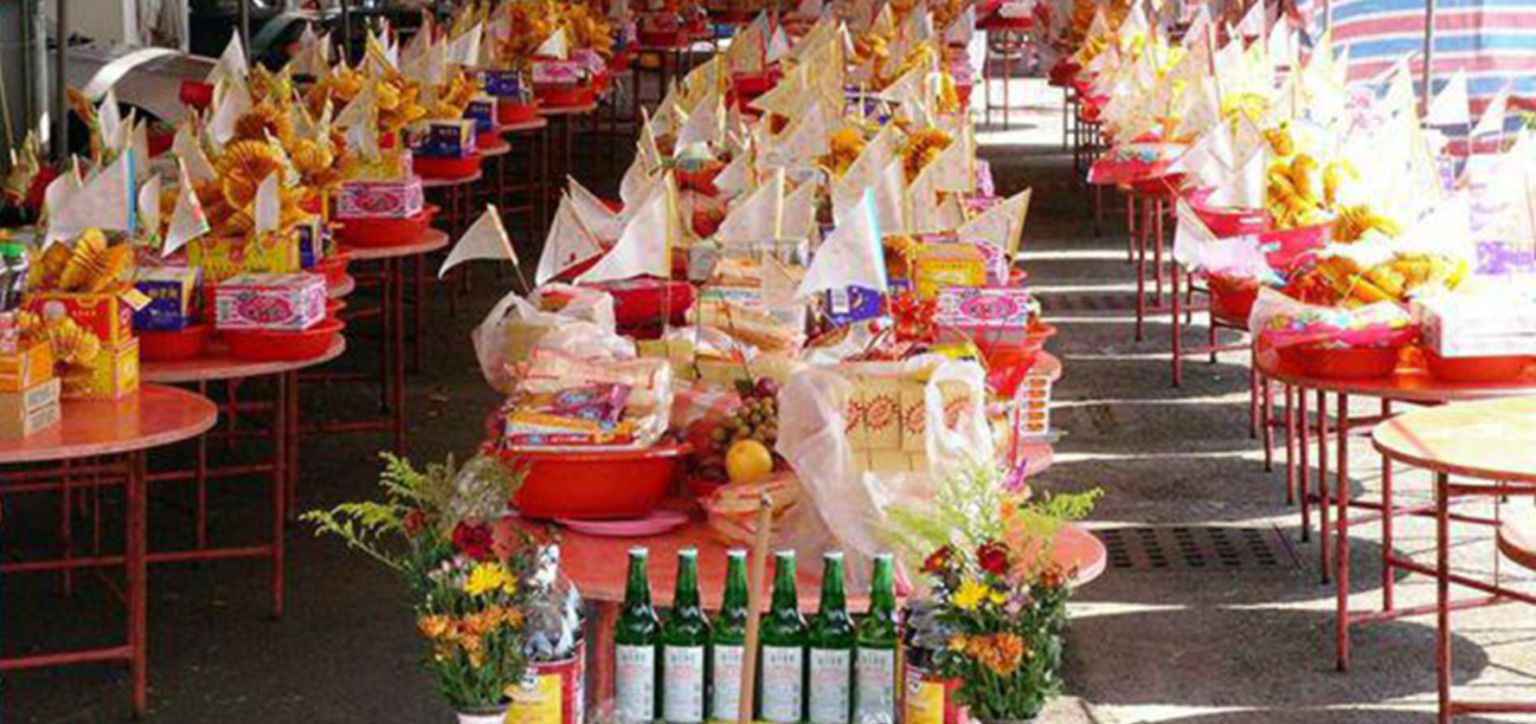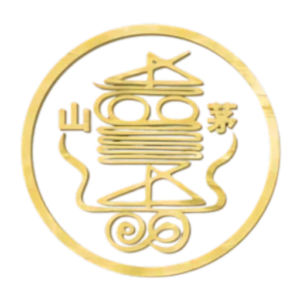Lunar 7th Month Hungry Ghost Festival
Pardon the sins of the dead
七月中元节 亡灵赦罪
Taiwan Mao Shan Zong Tan, Lee Gong Ming
The Chinese ethnic group has always regard the virtue of cherishing the memories of their ancestors, as well as respecting the heaven as the foundation of family succession. Every year during the festival of mid seventh month of lunar calendar, every household begins to carry out food offering Pudu . Whether it is Taoism or Buddhism, we remember our ancestors and the kindness given by them almost every year ritual. In addition to this, there is a deeper meaning behind the ancestral praying ritual.
The Chinese ethnic group other than differentiating the Yin and Yang, also attaches great importance to the division of solstice. They have also categories the 15th of lunar first, seven and ten month according three Yuan, namely the Shang (Upper) Yuan, Zhong (Mid) Yuan and Xia (Lower) Yuan.
Zhong Yuan Festival (The Hungry Ghost Festival) is a traditional festival in East Asia, which falls on the 15th day of the seventh lunar month. The Hungry Ghost Festival is located in the Mengqiu month in ancient times, it is the time when the emperor presented the newly harvested grains to the ancestral temple. Later, Taoism regarded the Zhong Yuan Festival as the day to seek to be pardoned of sins from Di Guan (deity) and it became a Taoist festival. It is also referred to as the birthday of Di Guan. Taoists eat vegetarian food on this day and pray for forgiveness for the sins of the dead. Performing ancestral praying rituals on this festival can eliminate karma and eliminate disasters for the family clan.
The Zhong Yuan Festival, the Shang Yuan Festival and the Xia Yuan Festival are collectively called the Thee Yuan Festival, which worships the three great emperors (deities) : Tian Guan, Di Guan and Shuiguan. It originated from the etiquette of the emperor worshiping heaven, earth and water in ancient China. The book, Etiquette: The Book of Ceremony records: “Sacrifice to the sky and burn firewood, offer sacrifices to the rising mountains and hills, offer sacrifices to the sinking rivers, and offer sacrifices to the earth.”
Usually before one participates in the Di Guan pardoning of sins ceremony, a Taoist priest must review the actual situation of the family and give advice based on the family’s population size and development. Through the death reasons of the ancestors, if there is a tendency for illness, premature death, accidental death, or a high divorce rate, or an unstable career, Taoist priests will give advice on performing the right rituals for families facing such phenomena. When performing Taoist rituals, some issues need to be dealt with at the wake of the deceased, but some rituals can be conducted after to make up for the lacking karmic merits. The Taoists priests as professionals must be consulted and take their appropriate advices respectfully.
When signing up to participate in the Ancestral Praying Ritual, remember to pray and inform of the ritual before the ancestor’s tablet in advance, and provide the name, time and place of the ritual to the ancestors. Upon arrival at the ritual event, remember to report to the Main Deity in the praying hall who your ancestors are, and state the name of your ancestor and address, etc. It is best to throw cups on the spot to confirm that it is okay for the ancestor spirits to participate.
Here I would like to specifically remind all who come across this post, especially those who met with many unfortunate problems occurring in the family in the past to be sure to report all the unfortunate and bad encounters to the Main Deity when you sign up and ask for these bad karmic events to be eradicated. Also carefully write down all the misfortunes of the family on red paper and burn it to the deities. In this way, after participating in the Ancestral Praying offering for several consecutive years, these problems in the family will gradually improve.
The family is connected by bloodline and even after the body disappears, the connection of the soul will not be broken! When performing the Zhong Yuan Festival Ancestral offering ritual for the ancestors, it is helping to clean up the sins of the bloodline. The purer and clearer the bloodline of the ancestors, the cleaner the future of the descendants will be! A family whose blood and soul are pure will have descendants born in the future who will have both merit and wisdom, and will achieve even greater merits in the world.
七月中元节 亡灵赦罪

台湾茅山宗坛李贡铭
中华民族对于缅怀祖先的美德,即以敬天尊祖视为家族传承的根本所在。年年每逢农历中元佳节,家家户户就开始办理普渡的科仪,不论信仰是道或佛教,几乎年年都会缅怀祖先给予的恩德。为此之外,祖灵拔度科仪还有更深的义理。
中华民族对阴阳的年度分法,除重视分至之外,并将一年农历正、七、十月十五日,分为三元,有上元、中元、下元。
中元节为东亚地区的传统节日,就是农历七月十五。中元节所在的孟秋月是天子以新收成的五谷,进献于宗庙的时节。后来道教视中元节为地官赦罪日而成为道教节日,又称地官诞,是指三官大帝的地官大帝(全名:中元二品七炁赦罪地官洞灵清虚大帝青灵帝君)诞辰。道教在此日素馔普渡,祈请为亡灵赦罪。在此节日举行祖先超拔科仪,能为家族消灭业障、消灾解厄。
中元节和上元节、下元节合称三元节,崇祀三官大帝天官、地官和水官,源自于中国上古时代,天子祭天、祭地和祭水的礼仪,《仪礼·觐礼篇》记「祭天燔柴,祭山丘陵升,祭川沉,祭地瘗」。
通常民间参加地官赦罪科仪前,都得由道士来观察家族实际情况,视其家族人丁与发展状态给与意见。从先祖的往生迹象考察,若有偏向病痛、夭折、意外死亡,或离婚率高、事业颠波不定者,类似有此现象的家族,道士都会给予办理科仪的意见。办理道场科仪,有些问题是在往生时举办的,但有些是在事后可以补足的功德,必须尊重专业的建议办理为宜。
在报名参加祖灵超拔时,记得要事先在祖先牌位上做禀告,将参加的名称与时间地点都要提供给祖先。在莅临道场的现场时,记得还要向主事神灵禀告,你的祖先是谁,说出代表祖灵与地址等。最好是能当场掷茭请示,确认祖灵参加没问题。
这里要特别叮嘱有缘人,家族过去发生的诸多不幸问题!务必要在报名参加时禀告作主神灵,请求把这些罪恶给予消灭殆尽。把家族种种不幸事由,通通仔细写在红纸上烧化给神灵,这样连续参加几年拔渡法会之后,家族的这些问题就会逐渐地改善了。
家族血脉联通,肉体消失之后,但那灵魂的连结是不可能中断的!中元为祖先办理拔度科仪,就是在帮忙清理血脉的罪恶,祖灵血脉越单纯且清澈,子孙的将来就能干干净净!使其血脉灵魂清澈的家族,未来诞生的子孙福德智慧兼备,且在世间的成就功德,更为高明了得。

